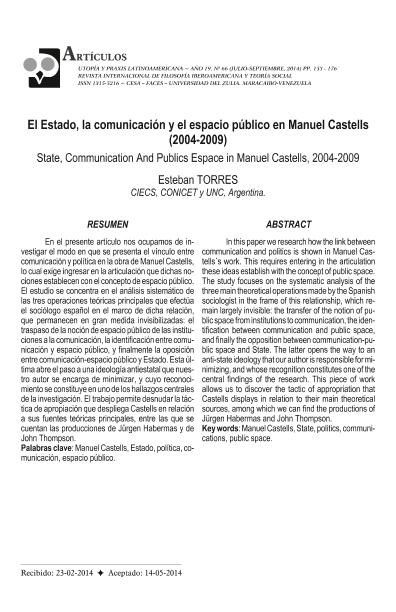Mostrar el registro sencillo del ítem
dc.contributor.author
Torres Castaños, Esteban

dc.date.available
2018-06-15T16:10:24Z
dc.date.issued
2014-07
dc.identifier.citation
Torres Castaños, Esteban; El Estado, la comunicación y el espacio público en Manuel Castells, 2004-2009; Universidad de Zulia; Utopía y Praxis Latinoamericana; 19; 66; 7-2014; 153-176
dc.identifier.issn
1316-5216
dc.identifier.uri
http://hdl.handle.net/11336/48789
dc.description.abstract
En el presente artículo nos ocupamos de investigar el modo en que se presenta el vínculo entre comunicación y política en la obra de Manuel Castells, lo cual exige ingresar en la articulación que dichas nociones establecen con el concepto de espacio público. El estudio se concentra en el análisis sistemático de las tres operaciones teóricas principales que efectúa el sociólogo español en el marco de dicha relación, que permanecen en gran medida invisibilizadas: el traspaso de la noción de espacio público de las instituciones a la comunicación, la identificación entre comunicación y espacio público, y finalmente la oposición entre comunicación-espacio público y Estado. Esta última abre el paso a una ideología antiestatal que nuestro autor se encarga de minimizar, y cuyo reconocimiento se constituye en uno de los hallazgos centrales de la investigación. El trabajo permite desnudar la táctica de apropiación que despliega Castells en relación a sus fuentes teóricas principales, entre las que se cuentan las producciones de Jürgen Habermas y de John Thompson.
dc.description.abstract
In this paper we research how the link between communication and politics is shown in Manuel Castells´s work. This requires entering in the articulation these ideas establish with the concept of public space. The study focuses on the systematic analysis of the three main theoretical operations made by the Spanish sociologist in the frame of this relationship, which remain largely invisible: the transfer of the notion of public space from institutions to communication, the identification between communication and public space, and finally the opposition between communication-public space and State. The latter opens the way to an anti-state ideology that our author is responsible for minimizing, and whose recognition constitutes one of the central findings of the research. This piece of work allows us to discover the tactic of appropriation that Castells displays in relation to their main theoretical sources, among which we can find the productions of Jürgen Habermas and John Thompson.
dc.format
application/pdf
dc.language.iso
spa
dc.publisher
Universidad de Zulia

dc.rights
info:eu-repo/semantics/openAccess
dc.rights.uri
https://creativecommons.org/licenses/by-nc/2.5/ar/
dc.subject
Manuel Castells
dc.subject
Estado
dc.subject
Politica
dc.subject
Comunicación
dc.subject
Espacio Público
dc.subject.classification
Otras Sociología

dc.subject.classification
Sociología

dc.subject.classification
CIENCIAS SOCIALES

dc.title
El Estado, la comunicación y el espacio público en Manuel Castells, 2004-2009
dc.title
State, Communication And Publics Espace in Manuel Castells, 2004-2009
dc.type
info:eu-repo/semantics/article
dc.type
info:ar-repo/semantics/artículo
dc.type
info:eu-repo/semantics/publishedVersion
dc.date.updated
2018-01-25T20:45:52Z
dc.journal.volume
19
dc.journal.number
66
dc.journal.pagination
153-176
dc.journal.pais
Venezuela

dc.journal.ciudad
Maracaibo
dc.description.fil
Fil: Torres Castaños, Esteban. Consejo Nacional de Investigaciones Científicas y Técnicas. Centro Científico Tecnológico Conicet - Córdoba. Centro de Investigaciones y Estudios sobre Cultura y Sociedad. Universidad Nacional de Córdoba. Centro de Investigaciones y Estudios sobre Cultura y Sociedad; Argentina
dc.journal.title
Utopía y Praxis Latinoamericana

dc.relation.alternativeid
info:eu-repo/semantics/altIdentifier/url/http://www.redalyc.org/articulo.oa?id=27937089013
dc.relation.alternativeid
info:eu-repo/semantics/altIdentifier/url/http://produccioncientificaluz.org/index.php/utopia/article/view/16302
Archivos asociados
